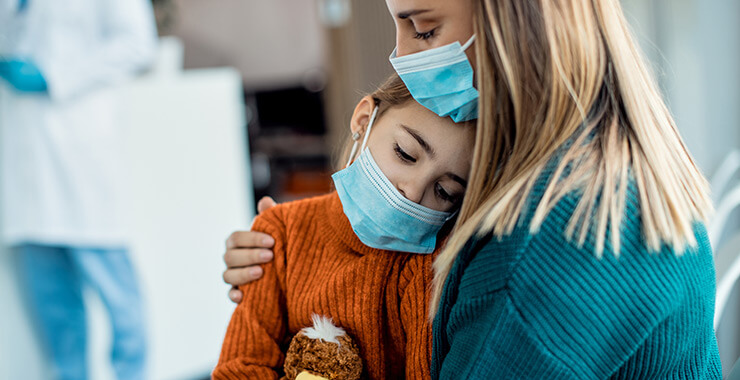It seems to happen every year. A discussion about seasonal flu and the jab can be divisive.
The truth is that the best way to protect yourself and your family against the flu is to be vaccinated. Still there are many people who him and haw about getting their shots because there are too many false facts and myths floating around out there.
First, it’s important to realize that Influenza causes millions of illnesses in the United States every year. According to the Centers for Disease Control and Prevention, (CDC), 2019-2020 flu vaccinations helped prevent an estimated 7.5 million illnesses – plus, thousands of hospitalizations and deaths. Source: Vaccine Effectiveness: How Well Do Flu Vaccines Work?
The flu causes roughly nine million to 40 million illnesses and 12,000 to 52,000 deaths annually.
Here are the 5 flu shot myths that it’s time to debunk, right now.

Myth #1: I get the flu when I get a flu shot
Since the flu vaccine’s first civilian use in 1945, flu vaccines have consisted of dead (or inactive) strains of influenza A and influenza B viruses. This means that it’s impossible for the flu shot to give you the flu.
The flu vaccine triggers your body’s immune response, so it recognizes the inactive viruses as intruders and creates antibodies. Sometimes the antibody creation results in mild side effects. It’s getting your body ready for a possible exposure to an active virus. Just remember that those side effects are really just a sign that the vaccine is working.
Myth #2: It’s better to catch the flu to build up your immune system
Some people think that getting the flu to boost their immunity instead of getting a flu shot is the better choice. If this is, you… stop it. There is no truth to this claim.
Influenza complications are serious, especially for young children and older adults. Getting a flu shot is a much safer solution. The immune response the flu shot triggers helps get your body ready if you’re exposed to the active virus.
The other upside is that when you get the flu shot, not only are you protected but so are those around you, including your loved ones.
It takes about two weeks, after receiving a flu shot, for your body to build up its immunity so that you don’t pass flu germs on to anyone else.
Myth #3: Waiting until winter is the best time to get a flue shot
Historically, peak flu season is between December and February, but the fact is that you can get sick as early as October. And no, getting vaccinated later won’t give you a longer period of protection. So, why leave yourself exposed by waiting when you really don’t know when flu season will strike?
Myth #4: It’s not necessary to get a flue shot every year
Every year, the CDC and the World Health Organization carry out rigorous testing to determine which strains of influenza pose the highest threats. Source: What are the main factors that influence which viruses are selected for use in flu vaccine production each year?
That’s why the flu vaccine formula is updated to help provide the best protection against the strains that will likely be most common that year. Plus, the flu shot is effective for one flu season. So, getting a flu shot annually is always the best practice.
Myth #5: Flu shots don’t work
Let’s look at the facts. When scientist’s predictions match the annual circulating strains, the CDC reports that getting vaccinated reduces your chance of catching the flu by up to 60%.
Flu shots also significantly reduce the risk of flu-related hospitalization for the elderly, working-age adults, and young children. A 2014 study showed that the flu vaccine reduced children’s risks of flu-related pediatric intensive care unit admissions by 74%. Source: Effectiveness of Influenza Vaccine Against Life-threatening RT-PCR-confirmed Influenza Illness in US Children, 2010–2012
Flu shots are also important for pregnant women, since pregnancy affects a woman’s susceptibility to the flu. The healthier a pregnant woman is the better it is for baby. Getting a flu, shot while pregnant is safe for both momma and her baby. Source: Is getting a flu shot while pregnant safe?
The science of vaccinations improves every year, and so do the odds of staying healthy with a flu shot.
A full list of age and health factors that can result in increased risk is available at People at Higher Risk of Developing Flu-Related Complications.

Let’s Talk Flu Shot Side Effects
The most common flu shot reactions include mild soreness and swelling or tenderness at the injection site.
Some people may also run a small fever, or complain of a slight headache, or muscle aches. And although it does happen, it’s extremely rare for someone to have a serious reaction to the vaccine. So, if you feel sick after getting the flu shot, it’s likely that what you are experiencing are normal reactions, because the vaccine will not give you the flu. You may also get the flu after getting the vaccine, because you have contracted a different virus. One that was not predicted by scientists at the CDC.
Generally, a day or two after the shot you may experience some mild discomfort, but this is so much better than flu symptoms which usually happen quickly and often involves fever, chills, extreme fatigue, muscle aches and more for several days.
Types of Influenza Viruses
There are four main categories of flu viruses, two of which are linked to seasonal epidemics.
Influenza A Strains (H1N1, H3N2)
Influenza A strains are the most common flu linked to epidemics. There are dozens of subtypes, but a few have emerged in recent years as the most common reasons that people get sick.
Influenza B Strains (B/Yamagata, B/Victoria)
There are fewer strains of influenza B viruses, but these are also linked to the seasonal flu. This year, the FDA made updates for B/Victoria strain. The B/Yamagata strain is the same as last year.
Influenza C Strains
Influenza C is linked to mild respiratory illness and is generally not the cause of severe flu cases or epidemics.
Influenza D Strains
Influenza D strains are only known to affect cattle, and do not cause illness among humans.
When to Seek Treatment for the Flu
Hopefully, you have scheduled an appointment with a medical provider for your flu shot, but if you end up with another strain the of virus you should stay plan to stary home as soon as you notice the first signs of symptoms.
Next, plan to stay home and isolated for at least 48 hours after your fever is gone because you may still be contagious even after your symptoms have subsided. Most healthy adults recover without needing medical care.
Visit your medical care provider if you have underlying health issues asthma, obesity, COPD, diabetes autoimmune disorders, or if you are pregnant.
If you are experiencing extreme flu-like symptoms (see below) or if your symptoms have not improved after 48 hours, see your doctor.
- Nausea
- Vomiting
- Diarrhea
When to Seek Emergency Medical Care

Warning signs for children:
- Fast or troubled breathing
- Bluish or gray skin color
- Severe or persistent vomiting
- Signs of dehydration like the absence of urination, or in infants, a lack of tears when they cry
- Not waking up or not interacting
- Extreme irritability
- Improvement in flu-like symptoms with a sudden return of fever, a worse cough, or breathing difficulties
- Seizures (uncontrolled convulsions)
Warning signs for adults:
- Severe or persistent vomiting
- Difficulty breathing or shortness of breath
- Purple or blue discoloration of the lips
- Pain or pressure in the chest or abdomen
- Sudden dizziness
- Confusion
- Improvement in flu-like symptoms with a sudden return of fever, a worse cough, or breathing difficulties
- High fever
Say Boo to the Flu!
Don’t wait to schedule your flu shot this year. Vaccines are easy, fast, and nearly free for everyone. You can significantly reduce your risk of getting the flu and passing it to others. If you have questions about which vaccine is best for you, talk to your doctor or other healthcare professional.
Getting a flu shot is easy, there are several clinics in our area offering this service. If you are concerned about your flu symptoms, don’t hesitate to make an appointment or just stop in and we’ll take care of you as soon as possible. Start a Virtual Appointment or visit us in-office.






